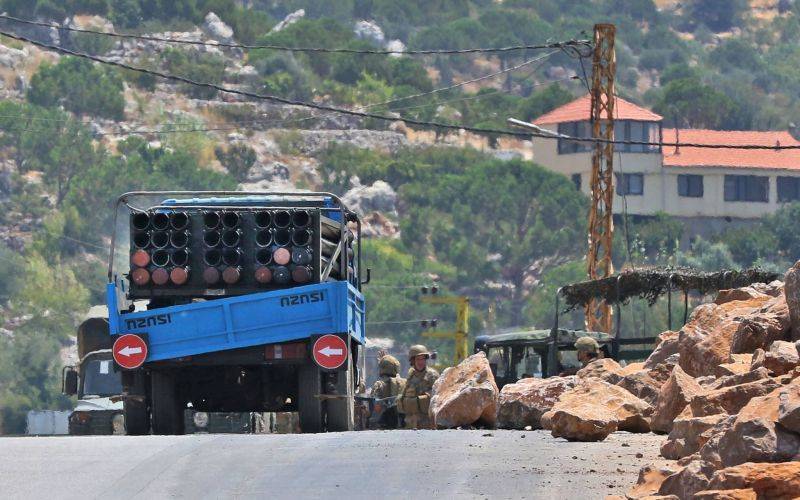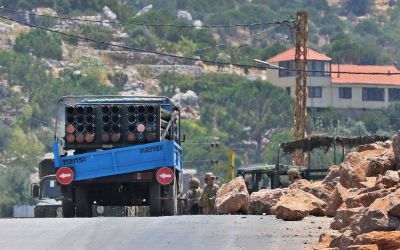
The army intervened on Aug. 6 in the village of Shwaya, Hasbaya, where the Druze residents intercepted a vehicle carrying a rocket launcher belonging to Hezbollah. (Credit: Mahmoud Zayyat/AFP)
Hezbollah is surrounded by crises. In the wake of the 2020 Beirut port explosion, the party began drawing up worst-case scenarios. When caretaker Prime Minister Hassan Diab resigned, there was talk within the party that the caretaker cabinet would continue to conduct day-to-day business until the end of the presidential term in 2022, among other options.
Hezbollah has a political and strategic appraisal unit and a study and research center. For the past year, these services have been working to assess potential future scenarios and drawing up plans to cope with developments.
On the basis of these efforts, Hezbollah has considered three scenarios and developed plans to deal with each of them. First, the party has a plan in case a government involving all the various political forces is formed.
Should that fail, the Shiite party would work on refloating the caretaker government so it could conduct state affairs amid the country’s meltdown.
But if the situation in the country deteriorates further without a government being formed, Hezbollah would be logistically prepared to protect its popular base and strongholds, in terms of security, food and social well-being. This would entail ensuring a fuel supply, even if this means the fuel comes from Iran, through Syria.
Hezbollah has been closely watching the government formation process since Mustapha Adib was appointed to form a cabinet following Diab’s resignation in the aftermath of the Aug. 4, 2020, port explosion. It continued to watch as Adib stepped down and Saad Hariri was designated in October, and then as Hariri quit the task and was replaced by Najib Mikati last month.
Hezbollah endorsed these three Sunni figures’ appointment because it has no desire for Sunni-Shiite strife, and is more inclined to a middle-ground solution leading to the formation of a cabinet in which everyone assumes his responsibilities. The party does not want to be blamed solely for the crisis or accused of obstructing cabinet formation.
Although Hezbollah wants a new government to see the light of day, sources close to the party say they believe the circumstances that impeded Adib and Hariri’s mission remain unchanged, and that Hezbollah is not optimistic about Mikiati’s ability to make a breakthrough in cabinet formation.
When the party decided to nominate Mikati in parliamentary consultations, after having nominated no one in the previous two rounds of consultations, the Free Patriotic Movement opposed this decision, considering it a betrayal of the party’s allies.
A Hezbollah delegate visited the FPM’s leader, MP Gebran Bassil of Batroun, to whom he explained that Bassil’s party cannot stand in the face of Sunni unanimity and that the country cannot be left without a government, because all signs indicate the situation will explode if no government is put in place.
But Hezbollah’s decision to vote for Mikati actually had a more important goal — to avoid being blamed for obstructing the cabinet’s formation, but without pressuring President Michel Aoun and Bassil, his son-in-law, to make concessions in this regard.
Following a less-than-optimistic meeting with Aoun, Mikati met with Hussein Khalil, Hezbollah Secretary-General Hassan Nasrallah’s political assistant, urging him to push Aoun to speed up the government's formation. Khalil made it clear that the party will not lift a finger to pressure the president or take any action that would undermine him.
Feeling cornered from all sides, Hezbollah is not willing to go against Aoun, which could mean losing strong support and Christian political cover during these turbulent times.
‘They do not know us’
Sources close to Hezbollah do not hide the party’s concern about the fact that it has been the target of political criticism at the popular level and through the media.
The party has, however, kept silent. Hezbollah did not officially respond to any accusations regarding its role in the political paralysis regarding the cabinet formation, the escalation with Israel or claims that it is tying Lebanon’s fate to the outcome of Iran’s negotiations with the West.
But as the Lebanese marked the first anniversary of the port tragedy, with many of them pointing the finger at Hezbollah, three rockets were fired from southern Lebanon at Israel.
While the Shiite party did not claim responsibility for this, many accused Hezbollah of firing the rockets to draw attention away from the anniversary. “They do not know us. That’s why they don’t know how we act,” a senior party official said.
According to security sources, it was the Nabad al-Saraya group, which consists of Palestinian and Lebanese operatives associated with Hezbollah, that was behind the rocket fire — the same group that launched missiles toward Gaza during the last round of violence between Palestinians and Israelis over the events in Sheikh al-Jarrah neighborhood of occupied Jerusalem in May.
The group acted under the “unified fronts” principle, which Nasrallah announced years ago, when he threatened Israelis that the party would retaliate if they attacked Iran.
Nabad al-Saraya’s launching of missiles toward Israel is seen as part of the escalation in the Persian Gulf earlier this month, when an Israeli tanker came under Iranian attack and the United States and the United Kingdom threatened to respond.
Israel’s retaliation for the rocket fire came in an unusual way. In addition to firing artillery at various locations along Lebanon’s southern border during the day, it conducted two airstrikes at night on a main highway near the Khardali Bridge, a strategic site connecting Lebanon’s far south to the various eastern and western areas of Lebanon used by Hezbollah when moving from the Bekaa Valley to the South.
The site is the demarcation line between the area of operation of the UN peacekeeping force in South Lebanon (UNIFIL) to the south of the Litani River, and the rest of the country.
Hezbollah interpreted the Israeli retaliation as a bid to alter the rules of the game and target zones deeper inside the Lebanese territory.
The party retaliated less than 48 hours later, wanting to keep the same rules of engagement and prevent any external pressure on UNIFIL to change its mission in the south, especially because the UN Security Council is scheduled to meet in late August to renew the UN peacekeeping force’s mandate.
Foreign parties
On Aug. 6, when Hezbollah operatives fired 20 rockets at Israel from a rocket launcher truck in the predominantly Druze village of Shwaya, something unforeseeable occurred.
The village’s residents stopped the truck and detained eight party members, confiscating their weapons. The residents did not want to put their village at risk of Israeli retaliation or of being used as a shield.
Hezbollah raced to calm the people, contacted the army to have its young men released and demanded that its rocket launcher be returned.
This was a major issue for Hezbollah. Never before was the party prevented from reaching the south to carry out its actions. This was a further indication that things were not the same and that sectarian conflicts could break out at any moment.
Hezbollah is feeling the noose tightening around its neck.
What’s more, this happened a week after the clashes that erupted in the town of Khaldeh between Hezbollah and Sunni tribes in the area against the backdrop of a blood feud, which led the main road between Beirut and the south to be blocked — a practice that was common during the Oct. 17, 2019, uprising — much to the party’s dismay.
Moreover, hostility toward Hezbollah is also mounting among Christians, who blame it for the country’s collapse and also for the circumstances that led to the Beirut port explosion.
This sense of resentment vis-à-vis the party was exacerbated following a fiery sermon a few days ago, on Aug.8, by Maronite Patriarch Bechara al-Rai, who accused Hezbollah of holding a monopoly on decisions pertaining to war and peace.
Hezbollah relayed a message to the patriarch that it had no desire to exchange diatribes, even though their views diverge. Sources close to Bkirk said that Christian religious leaders, for their part, have initiated contacts to defuse the escalating rhetoric.
Hezbollah believes that foreign parties are behind this mounting hostility against it and expects similar incidents to happen in the near future.
The party also says it believes that there are efforts to foment disputes among the Shiites in order to weaken the Shiite community itself.
Hezbollah has even gone so far as to accuse foreign parties and civil society forces of financing Shiite opposition figures so as to pave the way for dissent within the community.
This article was originally published in French in L’Orient-Le Jour. Translation by Joelle El Khoury and Sahar Ghoussoub.
